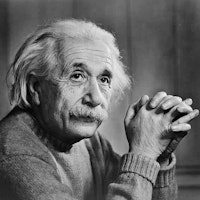By Understanding
Topic: Global Peace & Development
“Peace cannot be kept by force. It can only be achieved by understanding. You cannot subjugate a nation forcibly unless you wipe out every man, woman, and child. Unless you wish to use such drastic measures, you must find a way of settling your disputes without resort to arms.”
Albert Einstein, born on 14 March 1879 and passing away on 18 April 1955, stands as one of the most renowned theoretical physicists in history. Best known for his groundbreaking special and general theories of relativity, his scientific endeavors spanned a multitude of areas within the field of physics. Amongst his numerous accolades, he was awarded the Nobel Prize in physics for his elucidation of the photoelectric effect—a phenomenon that expanded the horizons of quantum theory.
Einstein's journey, however, wasn't merely defined by scientific discoveries, but by the myriad challenges he overcame across various dimensions of his life. In his spiritual journey, he grappled with the concepts of God and universe. Socially, he navigated the complexities of his time—facing the rise of anti-Semitism, experiencing exile from his homeland due to Nazi oppression, and advocating for civil rights, disarmament, and global peace. These adversities only strengthened his resolve and underscored his resilience.
Beyond his professional accomplishments, Einstein's life was enriched by a tapestry of relationships and dialogues with luminaries from diverse fields. He engaged in profound conversations on the nature of reality with the likes of the Indian poet Rabindranath Tagore, discussed the principles of non-violence with Mohandas Gandhi, and deliberated on humanitarian issues with Albert Schweitzer. Furthermore, his camaraderie with fellow scientists and physicists provided a fertile ground for intellectual exchanges, fostering an environment of collaboration and innovation during one of the most exciting epochs in scientific history.
Einstein, Albert, and Alice Calaprice. The Expanded Quotable Einstein. Princeton University Press, 2000, p. 158 [New History Society speech (14 December 1930), reprinted in "Militant Pacifism" in Cosmic Religion (1931)].

Albert Einstein
Copyright © 2017 – 2024 LuminaryQuotes.com About Us


Albert Einstein
Additional Albert Einstein Quotes
“All religions, arts and sciences are branches of the same tree. All these aspirations are directed toward ennobling man’s life, lifting it from the sphere of mere physical existence and leading the individual towards freedom. It is no mere chance that our older universities developed from clerical schools. Both churches and universities — insofar as they live up to their true function — serve the ennoblement of the individual. They seek to fulfill this great task by spreading moral and cultural understanding, renouncing the use of brute force.
The essential unity of ecclesiastical and secular institutions was lost during the 19th century, to the point of senseless hostility. Yet there was never any doubt as to the striving for culture. No one doubted the sacredness of the goal. It was the approach that was disputed.”
— Albert Einstein [Moral Decay, 1937; Later published in Out of My Later Years, 1950].